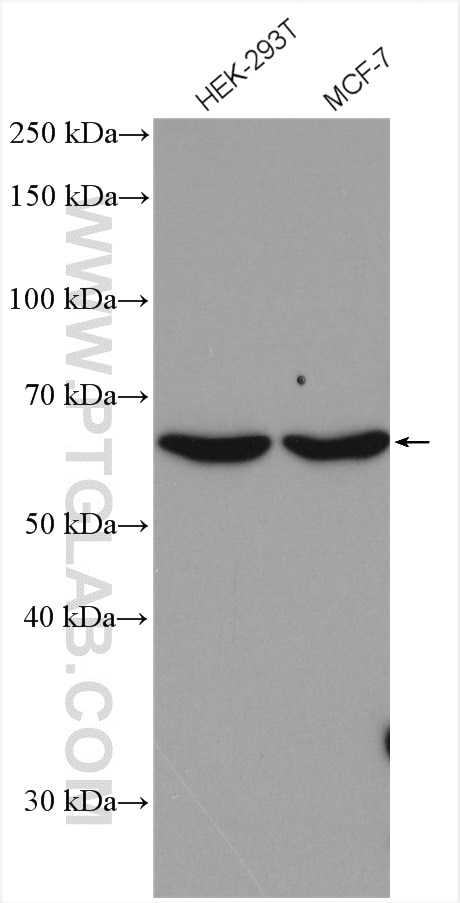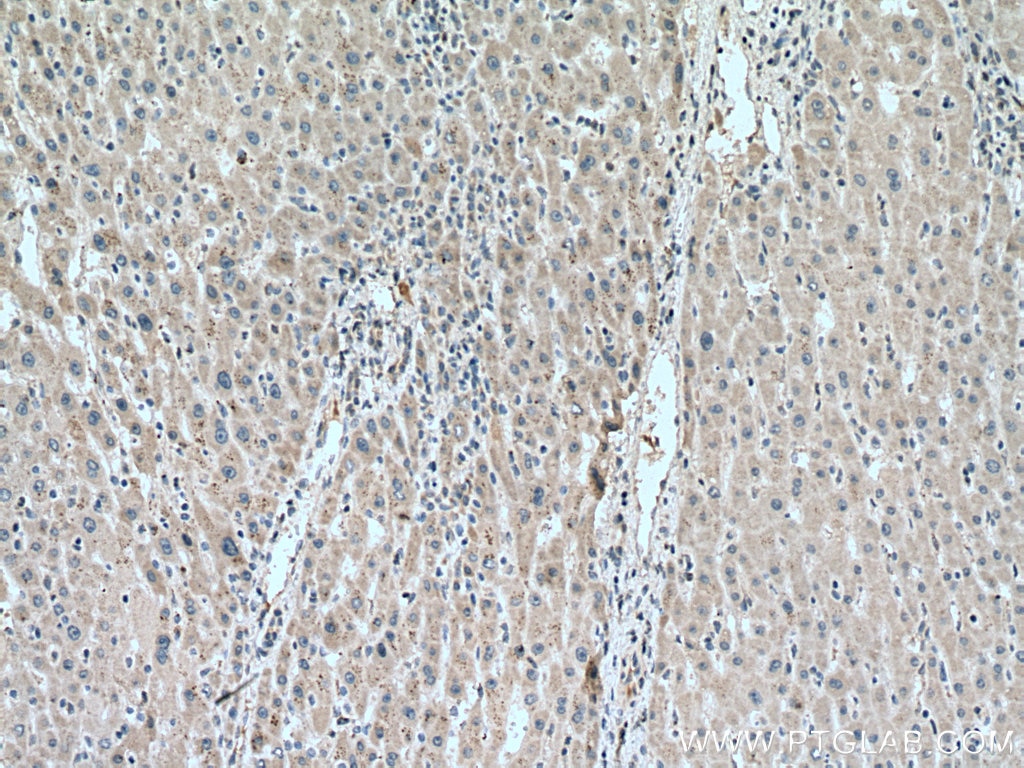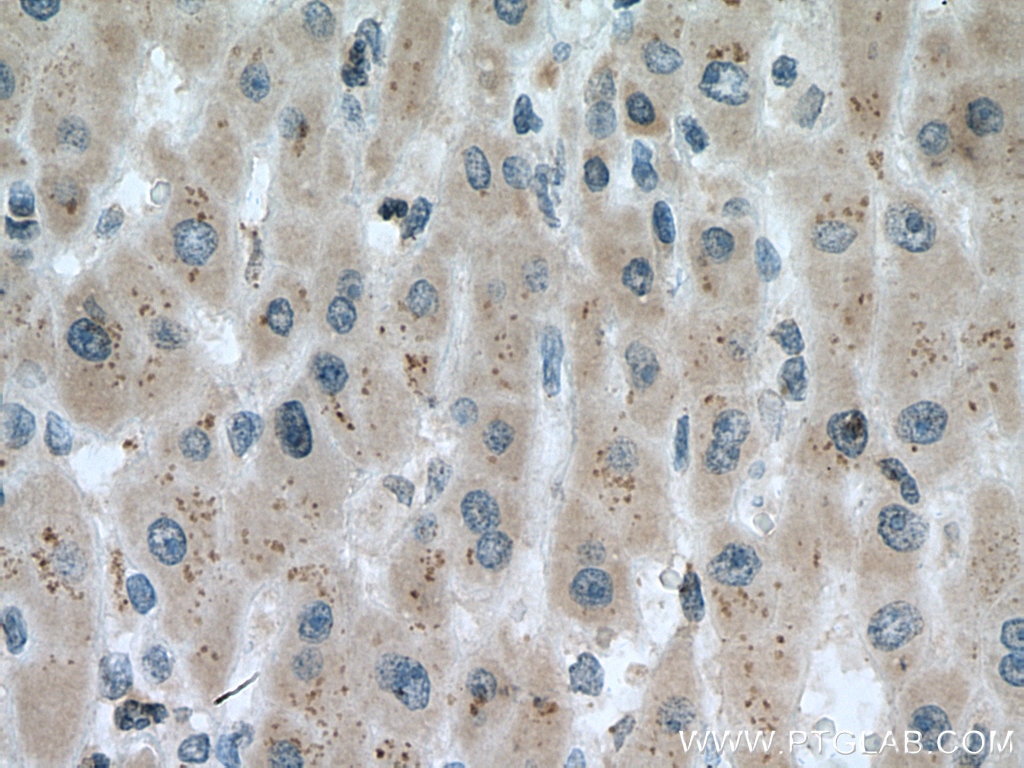- Phare
- Validé par KD/KO
Anticorps Polyclonal de lapin anti-ACAD9
ACAD9 Polyclonal Antibody for WB, IHC, ELISA
Hôte / Isotype
Lapin / IgG
Réactivité testée
Humain
Applications
WB, IHC, ELISA
Conjugaison
Non conjugué
N° de cat : 15770-1-AP
Synonymes
Galerie de données de validation
Applications testées
| Résultats positifs en WB | cellules HEK-293T, cellules MCF-7 |
| Résultats positifs en IHC | tissu de cancer du foie humain, il est suggéré de démasquer l'antigène avec un tampon de TE buffer pH 9.0; (*) À défaut, 'le démasquage de l'antigène peut être 'effectué avec un tampon citrate pH 6,0. |
Dilution recommandée
| Application | Dilution |
|---|---|
| Western Blot (WB) | WB : 1:500-1:1000 |
| Immunohistochimie (IHC) | IHC : 1:50-1:500 |
| It is recommended that this reagent should be titrated in each testing system to obtain optimal results. | |
| Sample-dependent, check data in validation data gallery | |
Applications publiées
| KD/KO | See 1 publications below |
| WB | See 6 publications below |
Informations sur le produit
15770-1-AP cible ACAD9 dans les applications de WB, IHC, ELISA et montre une réactivité avec des échantillons Humain
| Réactivité | Humain |
| Réactivité citée | Humain |
| Hôte / Isotype | Lapin / IgG |
| Clonalité | Polyclonal |
| Type | Anticorps |
| Immunogène | ACAD9 Protéine recombinante Ag8414 |
| Nom complet | acyl-Coenzyme A dehydrogenase family, member 9 |
| Masse moléculaire calculée | 69 kDa |
| Poids moléculaire observé | 60-65 kDa |
| Numéro d’acquisition GenBank | BC007970 |
| Symbole du gène | ACAD9 |
| Identification du gène (NCBI) | 28976 |
| Conjugaison | Non conjugué |
| Forme | Liquide |
| Méthode de purification | Purification par affinité contre l'antigène |
| Tampon de stockage | PBS with 0.02% sodium azide and 50% glycerol |
| Conditions de stockage | Stocker à -20°C. Stable pendant un an après l'expédition. L'aliquotage n'est pas nécessaire pour le stockage à -20oC Les 20ul contiennent 0,1% de BSA. |
Informations générales
Acyl-CoA dehydrogenases (ACADs) are a family of mitochondrial enzymes catalyzing the initial rate-limiting step in the β-oxidation of fatty acyl-CoA. ACAD9 belongs to the group of ACADs. The deduced 621-amino acid protein has a calculated molecular mass of 68.8 kD. It has an N-terminal leader sequence, 2 conserved motifs shared by all ACAD family members, and a potential N-glycosylation site(PMID:12359260). Defects in ACAD9 are a cause of acyl-CoA dehydrogenase family member type 9 deficiency (ACAD9 deficiency).
Protocole
| Product Specific Protocols | |
|---|---|
| WB protocol for ACAD9 antibody 15770-1-AP | Download protocol |
| IHC protocol for ACAD9 antibody 15770-1-AP | Download protocol |
| Standard Protocols | |
|---|---|
| Click here to view our Standard Protocols |
Publications
| Species | Application | Title |
|---|---|---|
EMBO Rep MITRAC15/COA1 promotes mitochondrial translation in a ND2 ribosome-nascent chain complex. | ||
Sci Rep Integrative analyses of translatome and transcriptome reveal important translational controls in brown and white adipose regulated by microRNAs. | ||
Cell Rep A membrane arm of mitochondrial complex I sufficient to promote respirasome formation.
| ||
Front Neurosci Ultrasound stimulation of the vagal nerve improves acute septic encephalopathy in mice | ||
Cancer Res Commun Tumor Vessel Normalization via PFKFB3 Inhibition Alleviates Hypoxia and Increases Tumor Necrosis in Rectal Cancer upon Radiotherapy |




